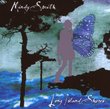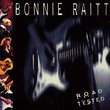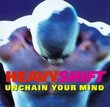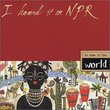| All Artists: Adrienne Young & Little Sadie Title: Art of Virtue (Dig) Members Wishing: 2 Total Copies: 0 Label: Addie Belle Release Date: 6/28/2005 Genres: Country, Folk, International Music, Pop Styles: Americana, Outlaw Country, Classic Country, Singer-Songwriters Number of Discs: 1 SwapaCD Credits: 1 UPC: 828092111127 |
Search - Adrienne Young & Little Sadie :: Art of Virtue (Dig)
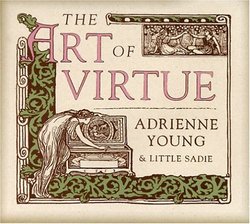 | Adrienne Young & Little Sadie Art of Virtue (Dig) Genres: Country, Folk, International Music, Pop
Fusing past and present in her pop-inflected old time music, Adrienne Young applies a worldly compassion, a poet?s pen and a spirit of independence and self-reliance to her sophomore effort The Art of Virtue, out June 28, ... more » |
Larger Image |
CD DetailsSynopsis
About the Artist Fusing past and present in her pop-inflected old time music, Adrienne Young applies a worldly compassion, a poet?s pen and a spirit of independence and self-reliance to her sophomore effort The Art of Virtue, out June 28, 2005, on her own Addiebelle Records (distributed by Virtual Label/Ryko). Inspired in part by Ben Franklin?s ?virtues of man? writings and stories from an older and perhaps wiser America, Young expands upon the themes of cultivation and stewardship so beautifully asserted on her acclaimed debut Plow to the End of the Row. With Virtue, Young makes a statement both personal and universal, both idealistic and constructive. "There seems to be a growing passion--collectively and individually--to understand the foundation of our American culture and how we?ve turned from that," states Young. "Personally, it steered me back toward a time when our country was rooted in agrarian ideals and words were powerful enough to begin a new world. Ben Franklin had such a practical approach toward nurturing virtue, the first point being nobody?s perfect!" The Art of Virtue was produced by Young with able assistance from long-time collaborator Will Kimbrough and acoustic recording genius Gary Paczosa. Besides Young?s accomplished songwriting, the 15 tracks include old-time fiddle tunes reimagined for a new day, the gospel standard "Farther Along," and the Grateful Dead?s classic anthem of renewal "Brokedown Palace." The message is consistent: every choice we make, from the food we buy to the channels we watch to the history we do or don?t preserve, has consequences. Our standards can be higher, she says, despite the many forces that seem to corrode them. Few songwriters can negotiate this terrain with ease and assurance, but Young is one who can. Raised in Florida and influenced by her grandfather (who at age 80 still picks in a bluegrass band), Young evolved from actress to recording artist after moving to Nashville and enrolling in Belmont University?s music business program. Her career accelerated after she took first place in the Chris Austin Songwriting Contest at North Carolina?s Merlefest. Then, working with Nashville pop and alt-country visionary Will Kimbrough, Young made Plow to the End of the Row. Not only was the album acclaimed by critics, it earned a Grammy nomination for album design. Those who bought the album were rewarded by the tiny package of seeds nested in the CD sleeve, an idea of Young?s that made her worldview tangible. With The Art of Virtue, Young?s singing and songwriting has achieved a new level of lushness and depth. The pop freshness so apparent on Young songs like "Home Remedy" and "I Cannot Justify" is here, though perhaps nestled deeper inside a musical bed chiefly made of Young?s old-time banjo, striking fiddling and silvery, bold acoustic guitar. In songs like "Rastus Russell," "Walls of Jericho" and "It?s All the Same," Young articulates a moral vision with stories and allegory. In the title track, she asserts a more direct call for action and accountability, in her own life and indirectly in the rest of ours. Similarly Requested CDs
|
CD ReviewsConsummate musicians, charged-up arrangements, thoughtful me J. Ross | Roseburg, OR USA | 07/01/2005 (5 out of 5 stars) "Playing Time - 58:15 -- Adrienne Young has a unique flair in her music that is an enchanting mix of old-time and pop with 21st century musical keenness and business acumen. Young's astute approach involves association with consummate musicians, charged-up arrangements, thoughtful messages, and bright and breezy vocalizing. Like her debut "Plow to the End of the Row," Young's sophomore effort, "The Art of Virtue," is on her own Addiebelle Records. One has to appreciate this talented, young lady's self-confidence as she continues to build her resume in a very competitive field. "The Art of Virtue" was inspired in part by Ben Franklin's `virtues of man' writings and stories. Songs like "My Sin is Pride" and "My Love Will Keep" and "Wedding Rings" emphasize the themes of morality, goodness, and high levels of integrity. Her messages might have a nostalgic look back to yesteryear, but her music is very contemporary and soothing. There's certainly nothing wrong with a thematic album that appeals to us in a visceral way "down where the roots grow deep." Ballads like "Ella Arkansas" and "Rastus Russell" paint powerful pictures and tell engaging stories while incorporating country and acoustic blues riffs. Art of Virtue features Young's proficient songwriting, some reinvented old-time fiddle tunes, the gospel standard "Farther Along," and the Grateful Dead's classic "Brokedown Palace." A Zydeco-flavored "Wedding Rings" is a spirited performance that gets us up and cutting a bean, while "Don't Get Weary" is an old-timey offering with frailed banjo, guitar, bones, resonator guitar, and voices. Young's lyrics offer mature and solid advice, usually gained from a lifetime of experience. Her smarts and wisdom belie her age. A grad of Belmont University's music business program, Young's career took off after winning the Chris Austin Songwriting Contest at Merlefest. Her "Plow to the End of the Row" CD earned a Grammy nomination for album design. On "The Art of Virtue," Young's songwriting exhibits honesty and a natural inclination to create lyrical and melodic treasures. Her singing shines with its greatest lustre on the slower songs, while a few pieces (like "Don't Get Weary") portray a more arduous side to her voice. An uptempo "Farther Along" is an interesting bluegrass presentation that certainly works, but her greatest success is as a storyteller of original folk tales. Young's parables put to music are very likeable. (Joe Ross, staff writer, Bluegrass Now) " New Age lyrics or not, this is good music William W. Smith | Basking Ridge, NJ USA | 09/13/2005 (5 out of 5 stars) "I can sympathize with the reviewer who found Adrienne's interview on NPR too flaky for his taste. My flake threshold is also low, so I know what he is talking about. I bought a CD by Kimmie Rhodes and just loathed it for that reason. But Adrienne Young is not that at all. This is great music that borrows from old timey country and bluegrass. I saw her at a hard-core bluegrass festival and she blew everyone away. The line for her CD booth stretched to the horizon. Adrienne plays a good clawhammer banjo and guitar, and her band is very good. And there are no wasted songs on this CD. Every one of them is a great song in its own right and very memorable. I like hard driving bluegrass and I also like this. It comes closer to old timey and string band music than bluegrass, but it is very well done and the song writing is excellent." The Best Album of 2005 Faithless Street | Austin | 01/04/2006 (5 out of 5 stars) "The Art of Virtue is a wonderfully conceived and beautifully executed album from one of the brightest lights shining for the future of country music. Young, with her band Little Sadie, turns a perusal of Benjamin Franklin's Poor Richard's Almanac into a album which contemplates both the history of our country and the place of a person trying to be good and true to themselves in current society. The album art even includes a book of the thirteen virtues for those who want to contemplate they (or even just contemplate the ones on which Franklin himself fell short.) Wrapped up in parables and poetry, Young delivers the goods on her Sophomore album, providing the perfect balance of an album that is intelligent and thought provoking as well as catchy and fun.
The album opens with the title track, a rousing bluegrass declaration of intentions which finds Young asserting "Gonna start a revolution/made of actions not of words/practice in the art of virtue/draw right on the learning curve." Next comes Little Sadie's rendition of the classic Bonaparte's Retreat. She follows this up with the song it inspired, "Hills and Hollers" about the changing landscape in America. A flurry of fiddle and banjo takes us back in time and traces the roots of the African slave ritual of "Jump the Broom" up the mountains where poor white people borrowed it's practicality in a place too few preachers ventured far too seldom. Will Kimbrough provides heavenly harmony vocals throughout the entire album, and few places is this more evident than on the lovely "My Sin Is Pride," a song about the strain pride puts on a relationship. Young and songwriting partner Mark Sanders touch on Emily Dickson with "My Love Will Keep," a song who's seasonal chorus reflects Dickson's "In the Spring of the Year," with opposite meanings of course. Next Young pays tribute to her family on a pair of wonderful ballads. "Pretty Ella Arkansas" sings of a strong willed, high spirited woman who lived to 91 and raised 9 children. Rastus Russell is a bloody, gothic story about a cold blooded killer and the swath of terror he cut through the country side (Young's grandfather was the police man who put the handcuffs on him). Next up is an old-fashioned, tongue in cheek song about a woman looking for a man to put a ring on her finger. She follows this with a fun and rousing rendition of Uncle Dave Macon's "Don't Get Weary." "Golden Ticket" provides another instrumental classic interlude. A pretty fiddle run leads us into the melancholy "Walls of Jericho." "It's All The Same" was inspired by the perspective's recorded in Benjamin Franklin's Autobiography, fit very easily into contemporary times from the opening "One foot in front of the other/It's hard as hell these days" through the closing "We stake it all on the coming of a savior/to right all the wrongs we've done." After this comes a warm and lively rendition of "Farther Along" (Billy in the Low Ground). Young closes the album with a delicate and understated cover of The Grateful Dead's melancholy and redemptive "Brokedown Palace." With The Art of Virtue Young makes an album in the true spirit of traditional bluegrass--a contemplation of values and ethics set to parables. However, there is no denying that Young's sound is completely her own and she renders all questions of new or old country moot by making a completely timeless album. Informed by and involved with the world around her (the back page of her liner notes offers fans websites to help them find local farmers markets and co-ops because "Eating is a spiritual, moral and political act."). In this album she moves past the personal journal styled writing of many of her contemporaries and into the realm of such greats as Rodney Crowell and Bob Dylan. Add to the mix understated, yet tightly woven and perfectly played instrumentals and evocative vocals and harmonies and the album is a rare jewel of high value. In a year that features new releases from such perennial benchmark setters as Rodney Crowell and Rosanne Cash, Adrienne Young and her band Little Sadie may have just put out the album of the year. " |

 Track Listings (15) - Disc #1
Track Listings (15) - Disc #1